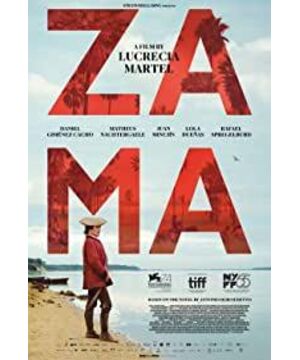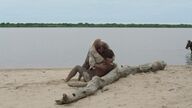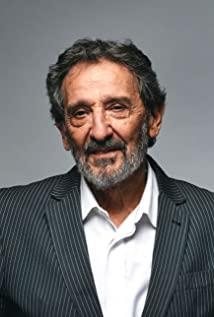There is a colonel in Marquez's pen. He has been stationed in Latin American colonies for decades, waiting for a pension that will never come, and is preparing for a cockfighting competition that has almost no chance of winning. For 56 years, all he has done is wait.
"Zama" seems to have something to do with this, but Marquez's description of the colonel is "not giving up dignity." This may be the content created by the scribe named Fernandez in the film. We You can think of him as a symbol of "Latin American literature." However, we can’t talk about “dignity” and “non-dignity” to Zama who is stationed there. Because of the lack of a “typical example” that can highlight this “typical character”, he does not have a wife who can depend on each other, only giving birth to him. The child’s lover does not even have a chance to be given a motive to "change the property", so there will not be his "refusal to sell" to highlight his dignity.
He is just a machine, a machine that continuously sends and receives. For most of the film, we see a series of lifeless "normalization" events, such as presiding over the court and approving the marriage of the dumb woman Malumba. And to welcome the transfer of the new governor, even in some extremely daily events, the "sender" has been internalized. This is a self-operating and self-repetitive machine.
(1) People imprisoned in space
The audience and General Zama share the unbearable time. The delayed narrative makes us feel the real time. This "delay" is largely through the alienation and contemplation of the screen. Just as Antonioni uses space to imprison characters, director Luquicia Martel also uses a confinement space, which appears to be open, natural, and in fact closed, but "Zama" is different from Antonioni’s order for everyone. The modernist urban space stuck in it does not lack the image of "fluidity" in this seemingly primitive historical drama. The former governor can be transferred back to Spain, and the new governor can enter, even if it is the "magistrate of the peace" who had an argument with Zama Assistant"-Vincent Prieto can also leave, everyone can come and go freely, except for the imprisoned "Chief Executive" Zama.
The first shot of the film is a panoramic view: Zama stands on the coast, gazing at the sea. Later, it will appear on the screen again from different angles. This is not an exit, but a border.
This sounds like Foucault’s concept of "panoptic prison". The concept of "panoptic prison" seems to be watered down in Zama. We cannot see what is watching him, but he is indeed entangled by something and cannot Leave.
This prison is not even in a completely known space. It still retains a heterogeneous and terrible identity. In the enclave, everything may be empirical, while in the "other", there is magical impossibility. The object of reduction, someone will die suddenly at any time. This is the black hole of space and the wandering spirit of Vicuña Porto. Later, he will appear in the article again.
(2) Elephant trainers in Southeast Asia, two Lerma
General Zama asked for transfer not from the sovereign state of Spain or Buenos Aires, but from Lerma, another small city in Argentina, where his family is said to live.
But this wish can never be realized, and the real "Lerma" town may be the same as here, even if he is transferred to, what he has to deal with in Lerma is still repeating his sending and receiving here. , "Family" made little change to his situation.
As for Lerma, all the heterogeneity from here comes from the imaginative level. General Zama imagined its difference. It is the object of Freud's so-called "drive". "Drive" means that it can never be achieved. So, it moves towards a certain object, but it can never be closed, just like a caterer in Southeast Asia hangs a bunch of bananas in front of it. The more the elephant moves forward, the less reachable it is. Suppose its neck stretches again. A little longer, it can be achieved, but it cannot realize this, and its neck cannot be extended a little bit. The elephant’s consciousness and the out of reach of its body constitute its own boundary.
Because of the elephant's own border and the bunch of bananas in the imaginary sense, it had to go forward and let the elephant man control it. It was also the Lerma in the imaginary sense and guaranteed the stay of General Zama.
The production and inability of desire to be closed are the prerequisites for the continuation of life and the foundation of the existence of consumer society and commercial advertising. Returning to the classic picture, when Zama stared at the sea, this behavior was endowed with a kind of divine prayer. The letter and the arriving ship were full of metaphysical meaning of "salvation", and these extended to send out a transfer. The subject of the letter-the Spanish royal family, a suzerain country far from Argentina, assumes a silent "God" role, or it may be the "open-sighted" subject in the "panoramic prison" mentioned in the previous chapter.
From this point of view, in the American continent, Zama returned to the power structure of the Middle Ages. Zama has the dual identity of believers and victims. The Spanish royal family is the presence but not manifested “God”, so the governor of the colony is an individual. The political obstacle to God, the Pope, obstructs the path to "salvation", and "salvation" itself does not seem to exist.
Therefore, in the film, you rarely see moving shots. The fixed lens is not only unbearable time, but also a solemn and sacred symbol. Just like the paintings of the medieval period, even Zama’s bright red military uniforms have faded.
(3) Who is afraid of Vicuña Porto? ——Political taxonomy
"Zama" tends to have a special recognition: it is not the recognition of the suzerainty, but the recognition of Zama's individual-a kind of virtual identity paradox.
This kind of depth-of-field lens is not uncommon in the film. Zama is the subject of the narrative, so the camera is placed on his side, and the aboriginal people are placed in the background. The composition is even artificially divided by the line of sight. Perhaps, Such a composition is not political or racially prejudiced, but it clearly reveals the distance between it and the locals.
His identity is Hispanic, but he was born in Argentina. There is a considerable distance between the two sides. This is the projection of the paradox of Latin America as a third country on the individual. A tradition—the Western world The tug-of-war, if this story is placed in the present, it will not be able to resist the crude universal interpretation of "the alienation of modernity from the individual". Therefore, it has to go back to the source of colonial history, just like Freudists advocate returning to the early years to look for the disease.
Zama was born into exile, not an active “colonization” behavior. All the legends about him went further than him. He constituted himself from the narration of the “other”.
In the "Oriento (Oriental)" narrative, he is "just without drawing a sword" and "the chief executive" who "will not hide his duties". In this scene, a counter-attack The shot reveals Zama's reflection, like the anxiety of waiting to be "essentialized" and the addiction to me in the mirror.
The "Chief Executive" is an identity that cannot be avoided. Although he does not have the majesty of a colonist, he cannot be easily transferred to office like Vincent Prieto. In this sense, he is similar to him. The alienated aborigines are framed in this land to repeat themselves. This is the "third country" characteristic embodied in him.
Vicuña Porto is another kind. He can be any name, because his name and what it refers to are a random combination, and there is no metaphor. He reminds us that there are dangers and things that cannot be reduced outside the order. , And naturalize them all under this symbol.
When Zama, in ragged clothes, walked towards the so-called "Vicunia Porto" with a knife, a rare close-up shot appeared. Vicunia, or the capture of Vicunia, was delayed by the film. In the final narrative, it still belongs to the sending-receiving, but the facilitator and the counter-mover are added to the narrative.
This name politically gives Zama the meaning of “action”. Politics is a taxonomy of power, or nomenclature. In ideology, the existence of a threatening “them” is very important, because there is nothing more This is the best way to establish and understand the concept of "us", "they" is a trash can, swallowing black holes in the cognitive and imaginary sense.
It’s impossible for Vicuña Porto to catch him. According to legend, he has been executed. The ears worn by the new governor are the best evidence. Some people say that he is still alive, so he had to launch Zama and his party to chase after him. It is impossible for him to be caught. The so-called "Vicuna Porto" only exists in the idea, and all visible people are simulacrums of this idea.
At the end, the moving lens appeared again, the camera slowly moved forward, the bright emerald green tone of the rainforest contrasted with General Zama’s dying situation when his hands were cut off. It forced the audience to go back to the beginning of the film and re-examine the fable about the fish. See exactly what Zama's behavior really led him to, the door of "alive" itself is open, and now, the god of death is about to close it.
references
García Márquez: "The Colonel Who No One Writes to Him", translated by Tao Yuping, Haikou, Nanhai Publishing Company, 1st edition, May 2013
Paul Schrader: Transcendental Style In Film, De Capo Press, 1988-8-22
Slavoj Zizek: "Enjoy your symptoms-Lacan inside and outside Hollywood", translated by Wei Guangji, Nanjing, Nanjing University Press, 1st edition, November 2014
View more about Zama reviews










